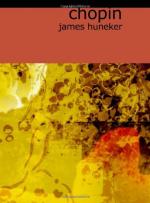I am impelled here to quote from Mr. Earnest Newman’s “Study of Wagner” because Chopin’s exaltation of spirits, alternating with irritability and intense depression, were duplicated in Wagner. Mr. Newman writes of Wagner: “There have been few men in whom the torch of life has burned so fiercely. In his early days he seems to have had that gayety of temperament and that apparently boundless energy which men in his case, as in that of Heine, Nietzsche, Amiel and others, have wrongly assumed to be the outcome of harmonious physical and mental health. There is a pathetic exception in the outward lives of so many men of genius, the bloom being, to the instructed eye, only the indication of some subtle nervous derangement, only the forerunner of decay.” The overmastering cerebral agitation that obsessed Wagner’s life, was as with Chopin a symptom, not a sickness; but in the latter it had not yet assumed a sinister turn.
Chopin’s fourteen days in Berlin,—he went there under the protection of his father’s friend, Professor Jarocki, to attend the great scientific congress—were full of joy unrestrained. The pair left Warsaw September 9, 1828, and after five days travel in a diligence arrived at Berlin. This was a period of leisure travelling and living. Frederic saw Spontini, Mendelssohn and Zelter at a distance and heard “Freischutz.” He attended the congress and made sport of the scientists, Alexander von Humboldt included. On the way home they stopped at a place called Zullichau, and Chopin improvised on Polish airs so charmingly that the stage was delayed, “all hands turning in” to listen. This is another of the anecdotes of honorable antiquity. Count Tarnowski relates that “Chopin left Warsaw with a light heart, with a mind full of ideas, perhaps full of dreams of fame and happiness. ‘I have only twenty kreuzers in my pockets,’ he writes in his note-book, ’and it seems to me that I am richer than Arthur Potocki, whom I met only a moment ago;’ besides this, witty conceptions, fun, showing a quiet and cheerful spirit; for example, ’May it be permitted to me to sign myself as belonging to the circle of your friends,—F. Chopin.’ Or, ’A welcome moment in which I can express to you my friendship.—F. Chopin, office clerk.’ Or again, ’Ah, my most lordly sir, I do not myself yet understand the joy which I feel on entering the circle of your real friends.—F. Chopin, penniless’!”
These letters have a Micawber ring, but they indicate Chopin’s love of jest. Sikorski tells a story of the lad’s improvising in church so that the priest, choir and congregation were forgotten by him.




